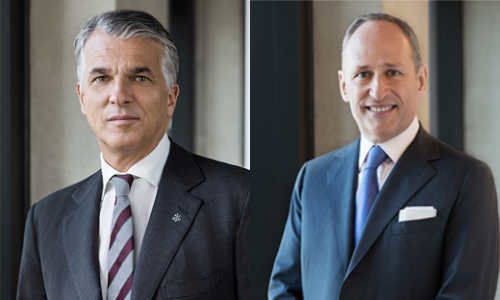UBS Hones French Defense Plan
For UBS, a guilty verdict and $5 billion fine in France was bitter and shocking. The Swiss bank is taking a more proactive tack as it prepares its appeal, finews.asia has learned.
It could hardly have been a worse outcome for the world's largest wealth manager: UBS was found guilty of tax evasion and money laundering in a Paris court in February. The Swiss bank was ordered to pay 4.5 billion euros ($5 billion) in fines and other charges.
The two people largely responsible for the French response – UBS boss Sergio Ermotti and long-standing legal chief Markus Diethelm – continue to express confidence in their strategy. A near-unprecedented vote of no-confidence in UBS' board and management did nothing to sway their views – Diethelm has no regrets, even after the February ruling, according to several people familiar with the matter.
Nothing is Sacred
That doesn't mean UBS isn't retooling its strategy as it heads into an appeals trial, likely towards the end of next year. Nothing is sacred, Diethelm has told lieutenants – not even a cadre of French legal star power UBS marshalled for the trial (many of them had been confident of winning when the trial wrapped in November).
UBS now views the key to winning in the high-stakes appeal in regaining control of its own narrative. The first trial was bogged down with too many protagonists and too many detailed responses to questions, is the theory. In the second go-around, the Swiss defendants may no longer, for example, explain «carnet du laits».
Withering Critique
Prosecutors allege the hand-written notebooks, since destroyed, represented a parallel record on its tax-dodging clients in the ledgers. UBS argued the records were simply for doling out bonuses.
The battle of how the dispute between French authorities and the Swiss bank is perceived publicly has already begun. UBS, which unleashed a withering critique of the judgement, is keen to spread the message in France that the first judgement wrongly ignores withholding tax agreements inked in Europe.
Supplicant Role
The Swiss bank, largely a supplicant until now, is seeking more legal room to maneuver. Long the victim of targeted leaks in French press, UBS is keen to highlight that French prosecutors didn't come up with substantial evidence against a single client of the Swiss bank in six years of investigation.
The implication is that without tax evasion as a predicate offense to pave the way, there is no case for the far more serious charge of money laundering. «If the gloves don't fit, you must acquit,» Diethelm has said privately, in reference to the argument in the 1995 murder trial of former football star OJ Simpson (he was acquitted).
Art Dealer Case
The bank faced tough questions from shareholders about the French case at its annual meeting earlier this month. Besides in the media, UBS also plans to more assertively spread its message via lawmakers, industry associations, and proxy advisers, among others.
One reason that Ermotti and Diethelm are unbowed is a precedent from France's appeals court in a somewhat similar case. Last year, a criminal court cleared Guy Wildenstein of the art dealing family of tax evasion.
Wildenstein had been accused, and later found guilty, of hiding 550 million euros – and faced a potential ten-year penalty. An appeals court overturned Wildenstein's conviction.
Good Omen?
UBS views the Wildenstein case, which involved a sprawling system of tax optimization involving Guernsey and the Bahamas, as a good omen: the 73-year-old art scion shows that higher courts aren't as susceptible to the politicking which the Swiss bank believes tainted the first ruling.
«We remain of the opinion that legal cases are decided based on what is just,» Diethelm told shareholders last week. «Unfortunately, we didn't manage that in our first trial.»
Katharina Bart contributed reporting




























